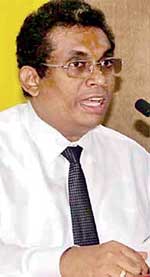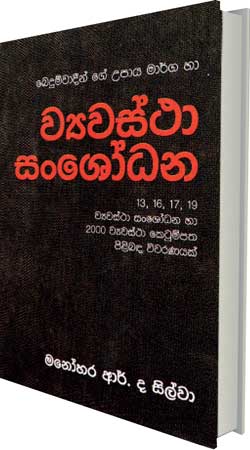Reply To:
Name - Reply Comment
Last Updated : 2024-04-24 03:58:00

Leading Constitutional Lawyer Manohara de Silva has authored a new book titled “The strategy of separatists and Constitutional Amendments” that deals with the 13, 16, 17 and 19 Amendments to the Constitution and the 2000 Draft Constitution. In an interview with , he speaks about the constitutional proposals and their implications on the country and the majority religion. Excerpts of the interview:
QWhat prompted you to author this book?
The primary reason is that people are misled by politicians. They say there is nothing to worry. They say there is just an innocent move of drafting a new Constitution. It is far from the truth. For instance, they say Buddhism will be accorded the foremost place and Buddha Sasana will be protected. Despite saying it, they are bringing in provisions that provide for conversions. If you read the recommendations by the committee that worked out proposals on fundamental rights to be incorporated in the proposed new Constitution, they have inserted a new word ‘propagation’. If the new proposals are implemented, the religious propagation will be a fundamental right.

QWhen that right is guaranteed, it will also apply for the propagation of Buddhism. What is your response?
You can propagate all the religions. But, if you assign foremost place to Buddhism, then, at the same time, you cannot propagate something else. If you have a secular state, the question does not arise. People of this country have always been for the protection of Buddha Sasana and giving it the principal place. That cannot be done by promoting other religions over it, instead. That is not even permitted in India. The other important thing is the limitation of cultural and religious practices to citizens in that country.
There is a difference between the teaching of religions and the exercise of religious practices as opposed to propagation of religions. If you allow that kind of cultural and religious propagation alien to Sri Lanka, what will happen is all the fundamentalist churches of the United States of America and all the fundamentalist religious organizations of the Arab world will come here. The proposal is to open it up to non-citizens. Today, the citizens can enjoy cultural rights and exercise religious practices. But, non-citizens cannot. For example, if a fundamentalist religious organization from the US or Saudi Arabia wants to come here and propagate fundamentalism, it will get the chance as it is a right open for non-citizens under the proposed new constitution. That is the reason for the countries to restrict cultural propagation alien to them. Otherwise, their own cultures will vanish. Sri Lanka is a small country. We have a very rich culture. The 2500 -year civilization will be destroyed instantly if you allow other cultures to overwhelm it. Persons on visiting visas can come and do propagation. If the new proposal is implemented, the restriction on such persons will amount to the violation of their fundamental rights.
QThere is a school of thought that giving foremost place to Buddhism will undermine the rights of minority religions. What are your views?
If you want to maintain the identity of the country, it will be needed. As for Vatican and Italy, their established religion recognized by the Constitution is Catholicism. If you take Norway, for instance, the Head of State has to be someone from the Christian Lutheran church. That is a country talking very much about fundamental rights. It is same with the Orthodox Church in Greece. In England, it is the Church of England. There is no written constitution in this regard there. But, it is an established fact in England by conventions and practices. On dollar notes in the US, it is mentioned ‘In God, we trust’. There, every state has a separate constitution. In most of these constitutions, anyone not believing in God is barred from becoming the head of that particular state. They try to preach to us, with the sinister aim of suppressing Buddhism. Religion and culture are protected in the US, Europe and the Arab world. Then, why are they trying to destroy our culture? They do it purely to destroy Buddhism.

We give Buddhism the foremost place, but Buddhists are not given the foremost place. There is a difference here. Giving Buddhism the foremost place does not mean giving the same for its followers. The present constitution does not say it. Article 9 says Buddhism should be given the foremost place, Buddha Sasana will be protected. At the same time, all the other religions are given their rights. The particular section says, “The Republic of Sri Lanka shall give to Buddhism the foremost place, and accordingly, it has been the duty of state to protect and foster Buddha Sasana while assuring to all religions including Buddhism the rights guaranteed by Article 10 and 14 (1) (e).
Buddhism is given foremost place. But, Buddhists and followers of other religions are equal. The preservation of our culture and civilization should be done. Otherwise, it is not to discriminate any other religious group. It is also to prevent other cultures coming in and overwhelming the prevailing majority culture.
QYou advocate a unitary constitution. What do you mean by unitary character?
A unitary status was interpreted by Justice Sarvananda quoting several authorities. Simply it is a situation where there is only one government. Federal state is where you find several governments. If you go a little bit further to explain this, in a unitary structure, Parliament is supreme. All other law making bodies are subordinate. That is the fundamental character. There cannot be independent bodies in a unitary state. In the present constitution, what has happened is that Parliament is not supreme. Though we say so much about supremacy of Parliament, it needs a two-thirds majority to repeal a statute of a provincial council. It can repeal its own laws by a simple majority. How can Sri Lanka Parliament be supreme when legislation by a subordinate body is held in such higher esteem than that passed by it?
QDoes it mean that the constitution lacks unitary features?
Yes. After the 13th Amendment was enacted, the unitary character was destroyed. We did not feel it because it was not implemented in full. If the police and land powers are given in keeping with the Constitution, in no time, it will lead to partition of the country. Fortunately, no government, including the government of former President the late J.R. Jayewardene who introduced it, implemented it in full. None of the Presidents, even former President Chandrika Bandaranaike Kumaratunga, did so. Why? They know it will lead to disaster if the 13th Amendment is implemented in full. We despise the 13th Amendment as it affects the unitary character of our constitution. We must appreciate that the J.R. Jayewardene government placed certain safeguards for it. The appointment of provincial governors and the fact that the national policies should be formulated by the central government are two of them. Also, there is the concurrent list that categorizes subjects to be handled both by the central government and the provincial councils. Then, there are residuary powers. All these factors kept Sri Lanka together.
What is now attempted through these proposals is to remove these safeguards. The moment you remove these safeguards to be replaced with these dangerous provisions, it will be detrimental.
QThere is an argument that the rights of minorities cannot be guaranteed under a unitary character. In this manner, there is a demand for a Federal state so that the minorities can be looked after by their elected representatives. What are your views?
If that is so, England has to be a country where minority rights are not guaranteed. In the world, there are only about 25 Federal countries out of the total 190 odd countries in the world. Majority are unitary states. Does it mean minority rights are not guaranteed in all these countries in the world?
These elements are trying here to get a Federal state as a stepping stone to Federalism. Their argument has no validity. Many countries in the world including England are unitary states. Protection of fundamental rights has nothing to do with the structure of governance. People are treated equally. People have recourse in judiciary. You can certainly improve the constitution. I will cite one example. Under the 19th Amendment, there is a clause included to establish the national procurement commission. Where is it now? Even the opposition is not talking about it. All the politicians, be they in the government or the opposition, do not want such a commission. That is the way for them to rob people and nation. If there is such a commission, traders, be the Tamils or Sinhalese, can get their tenders approved depending on the prices quoted. If the rule of law is upheld, the rights of minorities will get protected automatically.
They are not interested in the protection of rule of law. All these are brought to satisfy separatists.
QBut, the advocates of Federalism say the countries such as the US, Canada and Switzerland remain united and prosper due to Federalism. How do you respond?
If the country remains united, it should have a unitary constitution. What does a Federal state mean? It is a collective of states. What are the ingredients considered for the recognition of a separate country? You need a defined landmass. That is why, they asked for the merger of the north and the east. Then, they want a government of its own for that territory. They want subjects listed in the concurrent list to be transferred to the provincial councils.
Sri Lanka is together today because of the unitary state. If you create a Federal state tomorrow, then the territory and powers will be there. The international recognition is there because the western powers will be glad to do so. They will have a hold here. It will be a puppet state of the West. The reason for them to ask for a Federal state here is that it will be pro-western. We know what they do to us in Geneva. If it is a Federal state, it will be a difference between the cup and the lip. Sri Lanka will be partitioned.
QWhat is your view on the provincial council system as the unit of devolution?
The 13th Amendment was introduced with Indian warships docked just outside our territorial waters. Their planes were roaring around. Curfew was imposed under emergency. Indian premier the late Rajiv Gandhi came and signed the agreement. What legitimacy is there for such an agreement? Consequent to that, you see how the 13th Amendment to the Constitution was passed. The MPs were brought to five star hotels in Colombo and hosted for fabulous meals. Then, they were taken in vehicles to Parliament. Under threat and duress only, it was passed.
Power decentralization is always alright. I am not for a moment saying that all the powers must be exercised by the President and the Cabinet. You can have subsidiary bodies at provincial levels exercising power. That power must, however, be subjected to the centre without any restriction. If people across the country want to manage their local affairs like building access roads and all, that can happen but according to the national policies. If the centre cannot intervene when something is done against national interests, how can you expect the country to be together?
We should go back to the First Past the Post System. We can have a mixture with proportional representation system, to ensure proper minority representation. Then, one can elect his own representative. People in villages can look after their affairs.
QHow do you see improvements to the present constitution?
If you want to repeal the statute passed by a provincial council, you need two-thirds in Parliament under Article 154 G (2), (3), (4). You cannot get it without the support of the minorities. The primary objective of the minority parties such as the Tamil National Alliance (TNA) is separation. Their action shows it. They are against Sinhala people coming and residing there. They are opposed to the places of Buddhist religious worship there. They do not want toddy from the north to be sold there. It means their divisive mindset. If people cannot understand it, it will be foolish. We need to amend the 13th Amendment and remove Article 154 G (2),
(3), (4).

Add comment
Comments will be edited (grammar, spelling and slang) and authorized at the discretion of Daily Mirror online. The website also has the right not to publish selected comments.
Reply To:
Name - Reply Comment
On March 26, a couple arriving from Thailand was arrested with 88 live animal
According to villagers from Naula-Moragolla out of 105 families 80 can afford
Is the situation in Sri Lanka so grim that locals harbour hope that they coul
A recent post on social media revealed that three purple-faced langurs near t